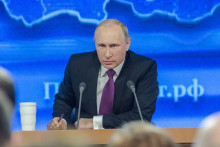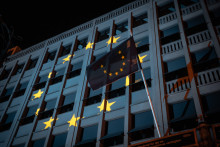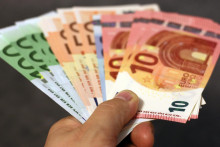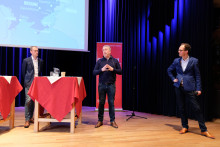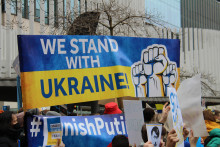Will there be war in Ukraine? That is already the case for a long time, replies Shawn Donnelly, assistant professor of Technology, Resilience and Europe at the UT. Since the revolution in Kiev and the annexation of Crimea in 2014, Russia and Ukraine have been in conflict. 'A war that has already cost 14,000 lives.’ But according to Donnelly, the current situation is different from previous years. The threat of escalation seems greater than ever. ‘The question is: why is it different? And why is it happening now?’
Russian Empire
For that, he says, we should look at Vladimir Putin. The Russian president looks at the world in an 'old school way', the assistant professor explains. Where European governments put democratic values and free trade first, Putin is all about military power and influence. Since the revolution in 2014, Ukraine has increasingly turned towards trade and association with Europe. 'This is something Putin sees as a direct threat', Donnelly states.
To understand why Putin sees this as a threat, Russia's recent history is important. After the collapse of the Soviet Union in the early 1990s, the country went into free fall. The former superpower disappeared from the world stage for a long time, much to Putin's dismay. When he came to power in 2000, his big goal became the reestablishment of the Russian empire, Donnelly continues. ‘And Ukraine is an integral part of this empire.’
Although the Russian army has become considerably stronger under Putin, in most other respects the country is not doing so well at all, says the assistant professor. The Russian economy (apart from gas exports) is of little significance. ‘Military threat is all Putin has. But because of its weak economy, Russia can never sustain a lasting war.’
Change
Recently this situation has changed considerably, he continues. That has everything to do with the rise of China. According to Donnelly, Russia and China look at the world in the same 'old school way'. Whereas Putin sees Ukraine as an integral part of the Russian Empire, China sees Taiwan as a renegade province that should be incorporated as soon as possible. This corresponding world view makes the situation on Ukraine's borders much more dangerous. ‘China has the enormous economic resources that Russia lacks. Because of their alliance, Putin is now able to act.'
According to Donnelly, the alliance between China and Russia also undermines Europe's 'old' strategy. Several European countries, and Germany in particular, see economic interdependence as an important instrument to curb Russia. This interdependence works in a simple way: Europe uses Russian natural gas and pays a good price in return. Because of this economic interdependence, no one is served by a large-scale conflict. Yet if China takes Europe's place as a major consumer of Russian natural gas, it will mean the end of this interdependence.
European collaboration
Therefore, Europe will urgently have to look elsewhere for its energy security and accelerate its energy transition, the assistant professor argues. ‘It is a weak point at the moment, a major vulnerability that Russia is exploiting'. Also, in the field of 'high-tech' warfare Europe is still too dependent on the United States. According to Donnelly, Europe will have to build a more autonomous military organization and weapons systems. ‘In fact, things are slowly moving in that direction. Look for example at the European Intervention Initiative, a military partnership that was initiated by France.’ The military cooperation gained momentum partly due to the annexation of the Crimea by Russia. This fact makes Donnelly ‘cautiously optimistic’. ‘Under high pressure, Europe is more inclined to work together. Just look at the Brexit or the migration crisis.'
Hybrid war
Although he is 'cautiously optimistic' about the European response, Donnelly says a Russian invasion will be 'ugly' and ‘messy’ either way. ‘Russia has already started a 'hybrid war'. They will try to further undermine Ukrainian authority. One possibility is a fake attack on Russian minorities in Ukraine, which - according to Russia - would leave them no choice but to invade in order to protect their own people.’ It remains to be seen how big the conflict will eventually become, Donnelly knows. ‘But in this situation, where tensions are running high, a small mistake can have big consequences.'
From Putin's worldview, it is not surprising that Russia feels threatened, Donnelly concludes. ‘It is certainly understandable, but not justified. Ukraine must be given the chance to participate in international affairs in a fair and peaceful way. That is why the West must make it clear that Putin is not going to achieve his goal, not even with military action.'


